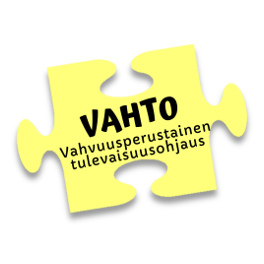Project

Developing Strengths-Based Future Guidance (VAHTO)
An increasing number of university-level students need support and guidance during their studies to recognise their strengths and to construct their studies and expertise in view of the needs of the future workplace. The aim of the VAHTO project was to develop strengths-based future guidance practices and methods especially suited for university-level students and thereby to construct a VAHTO guidance model.
Strengths-based future guidance refers to a comprehensive idea of guidance that recognises what is needed to advance one’s strengths and career management skills and how this is attached to successful career and study planning in such a way that the student can consciously construct an individual and smooth transition from studies to the labor market.
The objectives of the project were reached through the following:
- Finding out last-stage university students’ views, needs, and expectations in terms of guidance preparing them for the labor market,
- Studying the practices and methods of career and future guidance at the international and national levels,
- Based on the previous measures, developing strengths-based guidance at universities by implementing workshops that promote the participation of teachers, guidance staff, and students,
- Implementing strength-based guidance pilots at universities, and
- Based on the experience from the project and best practices, designing a VAHTO guidance model to be utilised in Lapland’s universities and outside the university establishment.
The developed The Strengths-Based Future Guidance (VAHTO) model meets the needs of university students and the challenges of the future labor market. Furthermore, the career and future guidance skills of those guiding university students and interested in this type of guidance orientation were strengthened through the project.
Overall, the project aimed to enhance university students’ study performance, facilitate their transition from studies to the labor market, and advance educational equality. In the long run, the results of the project prevent youths’ marginalisation and unemployment. We also believe the strengths-based guidance will increase the competitiveness of Lapland’s businesses by developing cross-sectoral and adaptive expertise among future professionals.
In developing the guidance methods, the project observed gender equality and the diverse ways of recognizing strengths. The VAHTO project was carried out through cooperation between the University of Lapland and Lapland University of Applied Sciences. The project has been funded by European Social Fund (ESF) and the Centre for the Economic Development, Transport and the Environment of Northern Ostrobothnia (Pohjois-Pohjanmaan ELY-keskus).
Contact information
Sanna Hyvärinen
University Lecturer
University of Lapland
sanna.hyvarinen(at)ulapland.fi
Helena Kangastie
Specialist
Lapland University of Applied Sciences
helena.kangastie(at)lapinamk.fi
Sofia Kari
Coordinator (on leave)
University of Lapland
sofia.kari(at)ulapland.fi
Jonna Löf
Education Specialist
Lapland University of Applied Sciences
jonna.lof(at)lapinamk.fi
Krista Rautio
Development Specialist
University of Lapland
krista.rautio(at)ulapland.fi
Netta Riponiemi
Project Coordinator
University of Lapland
netta.riponiemi(at)ulapland.fi
Satu Uusiautti
Professor
University of Lapland
satu.uusiautti(at)ulapland.fi
